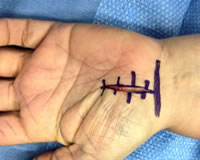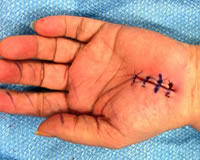Conditions Treated
Carpal Tunnel Syndrome
What is it?
The median nerve is one of the nerves in the wrist that supplies the sensation to the thumb, index and middle fingers. It also supplies some of the muscles that move the thumb. The nerve travels in a space, the carpal tunnel, along with the tendons of the hand. Compression of this nerve causes symptoms of pins and needles, numbness, pain and thumb weakness and the wrist, hand and fingers.
What causes it?
In the vast majority of people there is no obvious cause, however it is more common in middle age females. People who are pregnant, or have other medical problems such as diabetes, thyroid problems, arthritis or previous trauma to the wrist are more prone to the problem.
What are the symptoms?
The vast majority of people present with symptoms of pins and needles in the thumb, index and middle finger. This may occur during use of the hand and is often worse at night, disturbing sleep. Many people complain of wrist and hand pain that radiates into the arm.
More serious or longstanding cases may present with permanent numbness in the fingers, weakness of grip strength and inability to perform fiddly tasks such as doing up buttons or sewing.
Do I need any further investigations?
Carpal tunnel syndrome is a clinical diagnosis, however nerve tests, called EMGs, to assess how severely the nerve is compressed and damaged are carried out as it allows Andy to confirm the diagnosis and attempt to predict the likely outcome of surgery.
The test also helps to rule out other causes of the symptoms such as problems in the neck.
The EMG test will be carried out in clinic by one of the hand therapists or by Andy.
If you have medical conditions that might cause the symptoms, these may also be investigated with blood tests.
What is the treatment?
Initial treatment of the symptoms may take the form of splinting to help ease the numbness or an injection of steroid into the carpal tunnel to help relieve any swelling around the nerve. This may help in mild cases but generally are of little benefit in longstanding or severe disease. If you have a medical condition which can cause the symptoms this will be investigated.
Surgery to release the nerve from the tight tunnel is a very common, quick and simple operation. It involves making a small 3-4 cm incision in the hand and dividing the tight tissue that forms the roof of the carpal tunnel. This procedure is carried out under local anaeasthetic as a day case procedure and takes around 15 minutes. Over 90% of people have good resolution of the pins and needles within a few days of the operation.
How long will it take to recover?
Recovery from this operation is relatively quick. A bulky bandage will be applied to the hand after the operation. You will be seen by a hand therapist at 2 days who will remove this, clean and redress the wounds for you. The hand therapist will get you moving your hand very early after surgery to avoid stiffness.
The stiches are removed at around 14 days and Andy will review you at that point.
Following your 2 week appointment your hand therapist will get you moving your hand more and more and will also advise how to help soften and desensitize the scars.
What are the complications?
Any surgical procedure carries risks, however every effort is made to minimize these to ensure the best possible outcome from your surgery.
- Infection - Uncommon and usually treated very successfully with antibiotics
- Delayed healing - Smokers and those with diabetes are more prone to this
- Painful/Tender Scars - the vast majority of patients complain of some discomfort around the scar and thumb, this is know as pillar pain and generally resolves with time. Rigorous wound care and desensitization as directed by your hand therapist help prevent this.
- Stiffness - Operations to the hand may cause stiffness, this can be minimized by working closely with your hand therapist and getting your hand moving as early as possible.
- CRPS - An uncommon but potentially serious complication of hand surgery leading to pain, swelling and discomfort. It is impossible to predict this problem but working closely with you hand therapist and getting your hand moving early has been proven to significantly reduce the risk of this.
- Incomplete resolution of your symptoms - this may occur if you have had severe compression of the nerve, or have had the symptoms for a long time. Mr. Hacker will advise you if he feels you might be at risk of this
When can I get back to normal activities?
The hand MUST be kept clean and dry for 14 days until the sutures are removed. You should be able to return to "desk job" type activities within 1 week of the operation. Any manual work, heavy lifting or sporting activities should be avoided for at least 6 weeks.
You may return to driving in around 1-2 weeks. Please inform your insurance company that you have recent hand surgery to ensure that are happy for you to do so.


